Leviticus 10 meaning explained in AI Summary
Nadab and Abihu's Punishment
- Offering Strange Fire: This chapter recounts a tragic incident involving Aaron's sons, Nadab and Abihu. They offered "strange fire" before the Lord, meaning fire not obtained from the authorized altar flame. This act of disobedience resulted in their immediate death by fire.
- Warning to Priests: The severe punishment for Nadab and Abihu served as a strong warning to all priests about the importance of following God's instructions precisely when offering sacrifices. Any deviation from the prescribed rituals was seen as a serious offense.
- Mourning Restricted: Interestingly, while mourning was expected, outward expressions of grief like tearing clothes or letting hair grow wild were forbidden for Aaron and his remaining sons. This may have been to prevent them from being incapacitated by grief and ensure the continuity of their priestly duties.
This chapter recounts a tragic event and its immediate aftermath, highlighting the importance of following God's specific instructions for worship.
The Sin of Nadab and Abihu:
- Aaron's sons, Nadab and Abihu, offer "unauthorized fire" before the Lord, meaning they used fire not specifically commanded for the incense offering (Leviticus 10:1).
- God sends fire that consumes them, and they die in His presence (Leviticus 10:2).
Moses' Explanation and Further Instructions:
- Moses explains to Aaron that God's holiness demands reverence and obedience, even from those closest to Him (Leviticus 10:3).
- Aaron remains silent, understanding the gravity of the situation and accepting God's judgment.
- Moses instructs Aaron and his remaining sons, Eleazar and Ithamar, not to publicly mourn their relatives, demonstrating the priority of God's holiness over personal grief in this context (Leviticus 10:4-7).
- Priests are forbidden from drinking wine or strong drink while serving in the tabernacle, emphasizing the need for clear-mindedness and purity before God (Leviticus 10:8-11).
The Issue of the Sin Offering:
- Moses questions why the sin offering's meat was not eaten by Aaron and his sons, as was customary (Leviticus 10:12-15).
- Moses is angry with Eleazar and Ithamar, but Aaron defends them, explaining that their grief and the day's tragic events made them hesitant to eat the holy offering (Leviticus 10:16-20).
- The Lord accepts Aaron's explanation, acknowledging the complexity of the situation (Leviticus 10:20).
Key Themes:
- The Holiness of God: God's absolute purity demands reverence and precise obedience in worship.
- The Seriousness of Sin: Even unintentional disobedience can have severe consequences, especially in the context of sacred service.
- The Importance of Obedience: Following God's instructions is paramount, even when facing personal tragedy or uncertainty.
This chapter serves as a sobering reminder that approaching God requires humility, reverence, and strict adherence to His commands. It highlights the high stakes involved in serving the Lord and the importance of approaching Him with a pure heart and unwavering obedience.
Leviticus 10 bible study ai commentary
Leviticus 10 documents the catastrophic consequences of unauthorized worship immediately following the glorious inauguration of the Tabernacle. It serves as a stark and sobering lesson on the holiness of God, the absolute necessity of approaching Him on His terms, and the high standard of conduct required of His consecrated priests. The chapter moves from divine judgment to divine instruction, showing that God’s holiness both consumes disobedience and provides a path for restored, proper worship.
Leviticus 10 Context
This chapter occurs on the eighth day of the priestly consecration ceremony, the very same day the glory of the Lord appeared and fire consumed the first official sacrifices (Leviticus 9). The atmosphere was one of celebration and divine acceptance. In the Ancient Near East, priestly rituals were common, but often involved ecstatic states, intoxication, or syncretistic practices to manipulate the gods. Israel’s priestly code, underscored by this chapter's events, establishes a radical contrast: worship is not based on human-driven ecstasy or innovation but on sober, careful obedience to divine command.
Leviticus 10:1-2
Now Nadab and Abihu, the sons of Aaron, each took his censer and put fire in it and laid incense on it and offered unauthorized fire before the LORD, which he had not commanded them. And fire came out from before the LORD and consumed them, and they died before the LORD.
In-depth-analysis
- Nadab and Abihu: As Aaron’s eldest sons, they were in line for the high priesthood. Their recent experience on Mount Sinai with Moses and the elders (Exod 24:9-11) makes their transgression more shocking.
- Each took his censer: Their action was individualistic and presumptuous, not part of a unified, commanded corporate worship.
- Unauthorized fire ('esh zarah): The precise error is debated, but it was "strange" or "foreign" because it was which he had not commanded them. Potential issues include:
- Wrong Source: Taking coals from a source other than the bronze altar, the only authorized source (Lev 16:12).
- Wrong Time: Offering incense at a time not prescribed in the daily ritual.
- Wrong Place: Offering it in a location within the sanctuary not specified for that act.
- Wrong Motive: Seeking personal glory or performing an act of will-worship. Some have suggested they were under the influence of alcohol (supported by the subsequent prohibition in vv. 8-9).
- Fire came out from before the LORD: The same source of fire that signified acceptance in Lev 9:24 now signifies judgment. The holiness of God is shown to be a "consuming fire," blessing obedience and destroying presumption.
- Consumed them: This likely refers to a swift, lightning-like death, not incineration, as their priestly garments remained intact (v. 5).
Bible references
- Exodus 30:9: "You shall not offer unauthorized incense on it..." (Direct prohibition).
- Leviticus 9:24: "And fire came out from before the LORD and consumed the burnt offering..." (Contrast: same fire, different outcome).
- Numbers 3:4: "But Nadab and Abihu died before the LORD when they offered unauthorized fire..." (Historical record of the event).
- Hebrews 12:28-29: "...offer to God acceptable worship, with reverence and awe, for our God is a consuming fire." (NT principle drawn from such events).
Cross references
Exod 24:1,9 (their high privilege); Lev 16:1-2 (God references their death as a warning); Num 16:35 (Korah's rebellion punished by fire); 2 Sam 6:6-7 (Uzzah struck down for touching the ark).
Leviticus 10:3
Then Moses said to Aaron, “This is what the LORD has said: ‘Among those who are near me I will be sanctified, and before all the people I will be glorified.’” And Aaron was silent.
In-depth-analysis
- Those who are near me: This refers specifically to the priests, who have the privilege of drawing near to God in the sanctuary. Proximity to God demands greater holiness.
- I will be sanctified... I will be glorified: God's holiness is not a passive attribute; it is an active reality that must be acknowledged. God will be treated as holy (sanctified) by His ministers. If they fail, He will demonstrate His holiness and majesty (glorified) through righteous judgment. Worship is for God's glory, not man's.
- And Aaron was silent (wayyidom 'Aharon): This is a powerful expression of submission in the face of immense personal grief and terrifying divine judgment. Aaron offers no protest, excuse, or complaint. It reflects a profound understanding that God’s actions were just.
Bible references
- Isaiah 52:11: "...be clean, you who bear the vessels of the LORD." (The high standard for those in ministry).
- Ezekiel 28:22: "...and I will manifest my holiness in you in the sight of the nations." (God's holiness vindicated before others).
- Psalm 39:9: "I was mute and silent; I did not open my mouth, for it was you who did it." (A posture of submission to God's sovereign act).
- 1 Peter 4:17: "For it is time for judgment to begin at the household of God..." (Principle of judgment starting with God's own people).
Cross references
Lev 21:6,8 (priests must be holy); Ps 89:7 (God is feared in the council of holy ones); Amos 3:2 (God knows Israel uniquely, so He will punish their iniquity); Job 1:20-22 (Job’s silent worship after loss).
Leviticus 10:4-5
And Moses called Mishael and Elzaphan, the sons of Uzziel the uncle of Aaron, and said to them, “Come near; carry your kinsmen away from in front of the sanctuary and out of the camp.” So they came near and carried them in their coats out of the camp, as Moses had said.
In-depth-analysis
- Mishael and Elzaphan: As non-priestly Levite cousins, they were qualified to handle the bodies without disqualifying the active priests from their duties.
- From in front of the sanctuary: The defilement of death had to be removed from the sacred space immediately.
- Out of the camp: Death rendered a person unclean, and this impurity had to be quarantined from the community, which was consecrated to God.
- In their coats: They were removed still wearing their priestly tunics, a visual reminder that they died in office, in the very act of their sin. This serves as a perpetual warning sign attached to the priestly garments themselves.
Bible references
- Numbers 19:11: "Whoever touches the dead body of any person shall be unclean for seven days." (The law regarding defilement by death).
- Leviticus 21:10-12: "The high priest... shall not go near any dead person..." (Special rules preventing the high priest from this task).
- Acts 5:5-10: "...the young men rose and wrapped him up and carried him out and buried him." (Ananias and Sapphira are removed immediately after being struck down).
Cross references
Exod 6:18,22 (family lineage); Lev 13:46 (uncleanness requires being outside the camp); Num 5:2-4 (removing the unclean).
Leviticus 10:6-7
And Moses said to Aaron and to Eleazar and Ithamar his sons, “Do not let the hair of your heads hang loose, and do not tear your clothes, lest you die, and wrath come upon all the congregation. But let your brothers, the whole house of Israel, bewail the burning that the LORD has kindled. And do not go outside the entrance of the tent of meeting, lest you die, for the anointing oil of the LORD is upon you.” And they did according to the word of Moses.
In-depth-analysis
- Do not... mourn: Aaron, Eleazar, and Ithamar are forbidden from engaging in customary public mourning rites (unkempt hair, torn clothes).
- Lest you die: Their personal grief must be secondary to their priestly office. To abandon their post or identify with the sin via mourning would be an affront to God’s righteous judgment and would put them at risk.
- Wrath come upon all the congregation: The priests mediate for the people. If they fail or show solidarity with rebellion against God, the entire nation is endangered.
- Anointing oil... is upon you: The oil signifies their permanent separation and consecration to God. Their lives are no longer their own; they belong to the sanctuary. Their duty to the living God supersedes their duties to the dead.
- The whole house of Israel, bewail: The congregation is permitted to mourn the terrible judgment, acknowledging God’s awesome holiness and the loss from their community.
Bible references
- Leviticus 21:1-3: "A priest shall not make himself unclean for the dead among his people..." (Standard rules for priests regarding death).
- Ezekiel 24:16-17: "...I am about to take the delight of your eyes away from you... yet you shall not mourn or weep..." (Ezekiel commanded not to mourn his wife as a sign).
- Matthew 8:21-22: "...‘Lord, let me first go and bury my father.’ But Jesus said to him, ‘Follow me, and leave the dead to bury their own dead.’” (The call to discipleship taking precedence over all else).
Cross references
Lev 8:12,30 (the priestly anointing); Num 6:6-7 (the Nazirite vow included similar restrictions).
Leviticus 10:8-11
And the LORD spoke to Aaron, saying, “Drink no wine or strong drink, you or your sons with you, when you go into the tent of meeting, lest you die. It shall be a statute forever throughout your generations. You are to distinguish between the holy and the common, and between the unclean and the clean, and you are to teach the people of Israel all the statutes that the LORD has spoken to them by Moses.”
In-depth-analysis
- The LORD spoke to Aaron: This is a rare instance of God speaking directly to Aaron without Moses as an intermediary. It reinstates Aaron’s authority after the traumatic event and delivers a command pertinent to his specific priestly office.
- Drink no wine or strong drink: The placement of this command strongly implies that alcohol was a contributing factor in Nadab and Abihu's sin. Sobriety is mandated for clear judgment and discernment in holy service.
- Distinguish between the holy and the common: This is the core function of the priesthood. They must maintain clear spiritual and moral perception to identify what is set apart for God versus what is for ordinary use, and what is ritually pure versus impure.
- Teach the people: A key priestly duty is not just to perform rituals, but to be able to clearly instruct the congregation in God's laws. Intoxication would make this impossible.
Polemics
This stands in stark contrast to Canaanite and Egyptian religious practices, where ritual intoxication and ecstatic frenzies were sometimes used to try and achieve communion with deities. The God of Israel demands sober, clear-headed reverence.
Bible references
- Ephesians 5:18: "And do not get drunk with wine... but be filled with the Spirit." (The NT parallel between being controlled by a substance and being led by the Spirit).
- Ezekiel 44:21, 23: "No priest shall drink wine when he enters the inner court... They shall teach my people the difference between the holy and the common..." (A restatement of this priestly duty).
- 1 Timothy 3:2-3: "Therefore an overseer must be... sober-minded... not a drunkard..." (NT qualifications for church leaders).
Cross references
Prov 20:1 (dangers of wine); Isa 28:7 (prophet and priest erring through wine); Hos 4:6 (my people are destroyed for lack of knowledge); Titus 1:7 (elder must not be given to wine).
Leviticus 10:12-15
Moses spoke to Aaron and to his surviving sons, Eleazar and Ithamar, “Take the grain offering that is left of the LORD's food offerings, and eat it unleavened beside the altar, for it is most holy... But the breast of the wave offering and the thigh of the contribution you shall eat in a clean place... for they are given as your due...”
In-depth-analysis
- Moses spoke to Aaron: After the divine instruction in vv. 8-11, Moses now shifts back to the practical duties interrupted by the tragedy.
- Take the grain offering... eat it: This is not a suggestion but a command to resume their priestly functions immediately. Eating the holy portions was an integral part of their service and their God-given sustenance.
- It is most holy: This emphasizes that their consumption of the offering is a sacred act, part of the sacrificial system itself.
- Breast of the wave offering and the thigh: Moses reminds them of their portion from the peace offerings, underscoring the continuity of God's provision for the priesthood. This practical instruction was a test of their composure and renewed obedience.
Bible references
- Leviticus 6:16: "And what is left of it Aaron and his sons shall eat... in a holy place..." (The original command for the grain offering).
- Leviticus 7:31-34: "The breast shall be for Aaron and his sons... I have taken them from the people of Israel and have given them to Aaron the priest..." (The law of the priests' portion).
- 1 Corinthians 9:13: "Do you not know that those who are employed in the temple service get their food from the temple...?" (NT principle that ministers should be supported by their ministry).
Cross references
Lev 2:3,10 (grain offering laws); Num 18:8-11 (summary of priestly portions).
Leviticus 10:16-18
Now Moses diligently inquired about the goat of the sin offering, and behold, it was burned up! And he was angry with Eleazar and Ithamar, the surviving sons of Aaron, saying, “Why have you not eaten the sin offering in the place of the sanctuary, since it is a thing most holy and has been given to you that you may bear the iniquity of the congregation, to make atonement for them before the LORD?...”
In-depth-analysis
- Moses diligently inquired: Moses, as the leader, inspects the priestly duties to ensure they are done correctly.
- Behold, it was burned up!: The goat of the sin offering for the people was supposed to be eaten by the priests, but they had burned it completely instead.
- He was angry: Moses perceived this as another act of disobedience, a failure to follow the specific instructions of Lev 6:26-30.
- Bear the iniquity of the congregation: This is a crucial theological statement. By eating the sin offering, the priests ritually took the guilt of the people upon themselves, mediating God’s forgiveness. By failing to eat it, they broke this vital symbolic link.
Bible references
- Leviticus 6:26: "The priest who offers it for sin shall eat it..." (The explicit command they appeared to have violated).
- Leviticus 6:30: "But no sin offering shall be eaten from which any blood is brought into the tent of meeting..." (This is the exception that Aaron will implicitly use in his defense).
- Isaiah 53:11: "...by his knowledge shall the righteous one, my servant, make many to be accounted righteous, and he shall bear their iniquities." (A prophecy of the Messiah who truly bears iniquity).
- Hebrews 9:28: "so Christ, having been offered once to bear the sins of many..." (Christ as the ultimate priest and sacrifice who bears sin).
Cross references
Lev 9:3,15 (the offering in question); Heb 13:11 (bodies of animals whose blood is for atonement are burned outside the camp).
Leviticus 10:19-20
And Aaron said to Moses, “Behold, today they have offered their sin offering and their burnt offering before the LORD, and such things as these have happened to me! If I had eaten the sin offering today, would it have been acceptable in the sight of the LORD?” And when Moses heard that, he was content.
In-depth-analysis
- Aaron said to Moses: Aaron, now fully in his role as high priest, speaks up to defend his sons and his decision. He doesn't make an excuse, but gives a theological reason.
- Such things as these have happened to me: Aaron points to the divine judgment and his state of mourning and shock. His argument is that consuming a holy meal, which is an act of communion and celebration, would be hypocritical and improper given the circumstances of sin, judgment, and grief. It would have been ritually correct but spiritually unacceptable.
- Would it have been acceptable...? Aaron appeals to the deeper principle of what is pleasing to God (acceptable) over the mere letter of the law. He understood that God desires a proper heart disposition, not just rote ritual. He rightly judged that eating in his defiled state of grief would be unacceptable.
- Moses... was content: Moses recognizes the wisdom in Aaron's reasoning. This is a critical moment showing that true obedience is not legalistic but discerns the spirit and intent of God's commands. Aaron acted correctly as a high priest, making a spiritual judgment call.
Bible references
- Hosea 6:6: "For I desire steadfast love and not sacrifice, the knowledge of God rather than burnt offerings." (God prioritizes heart-attitude over ritual).
- 1 Samuel 15:22: "...Has the LORD as great delight in burnt offerings and sacrifices, as in obeying the voice of the LORD? Behold, to obey is better than sacrifice..." (Obedience of the heart is key).
- Mark 2:27: "And he said to them, ‘The Sabbath was made for man, not man for the Sabbath.’" (Jesus teaching that human well-being and spiritual reality can take precedence over ritual law).
Cross references
Deut 26:14 (prohibition of eating holy food while in mourning); 1 Sam 21:1-6 (David eating the holy bread); Prov 21:3 (doing righteousness is more acceptable than sacrifice).
Leviticus Chapter 10 analysis
- The Fire of God: The chapter powerfully demonstrates the dual nature of God's holy fire. In Leviticus 9, it is a fire of acceptance, signifying God's pleasure and presence. In Leviticus 10, it is a fire of judgment, consuming those who treat God's holiness lightly. This illustrates Hebrews 12:29: "our God is a consuming fire."
- The Silence of Aaron vs. the Speech of Aaron: Aaron's silence in verse 3 is a model of submission to God's sovereign and just act. His speech in verse 19 is a model of wise priestly discernment. He is silent before God but is able to reason wisely with man.
- Holiness vs. Legalism: The chapter ends on a surprising note. While it begins with a strict judgment for ritual failure, it concludes with Moses accepting Aaron's decision to deviate from a ritual command based on a higher spiritual principle. This shows that the Torah is not a flat, legalistic code but requires wisdom and discernment of God’s character. The goal is what is "acceptable in the sight of the LORD."
- A Priesthood Corrected: The priesthood began with glory (ch. 9), was immediately marred by sin and judgment (10:1-2), and was then corrected and re-established through divine instruction (10:8-11) and priestly discernment (10:19-20). It sets the stage for the laws of purity in the following chapters, grounding them in the reality of life and death before a holy God.
Leviticus 10 summary
Aaron’s sons, Nadab and Abihu, offer unauthorized fire and are instantly consumed by fire from God, demonstrating the deadly danger of profaning God’s holiness. Moses comforts Aaron by stating that God must be sanctified by those near Him. In the aftermath, God commands the priests not to drink alcohol on duty, so they can properly distinguish between the holy and common and teach the people. The chapter concludes with Aaron rightly discerning that eating the sin offering while in a state of grief would be unacceptable to God, an act of wisdom that Moses accepts, highlighting that true obedience flows from a discerning heart.
Leviticus 10 AI Image Audio and Video

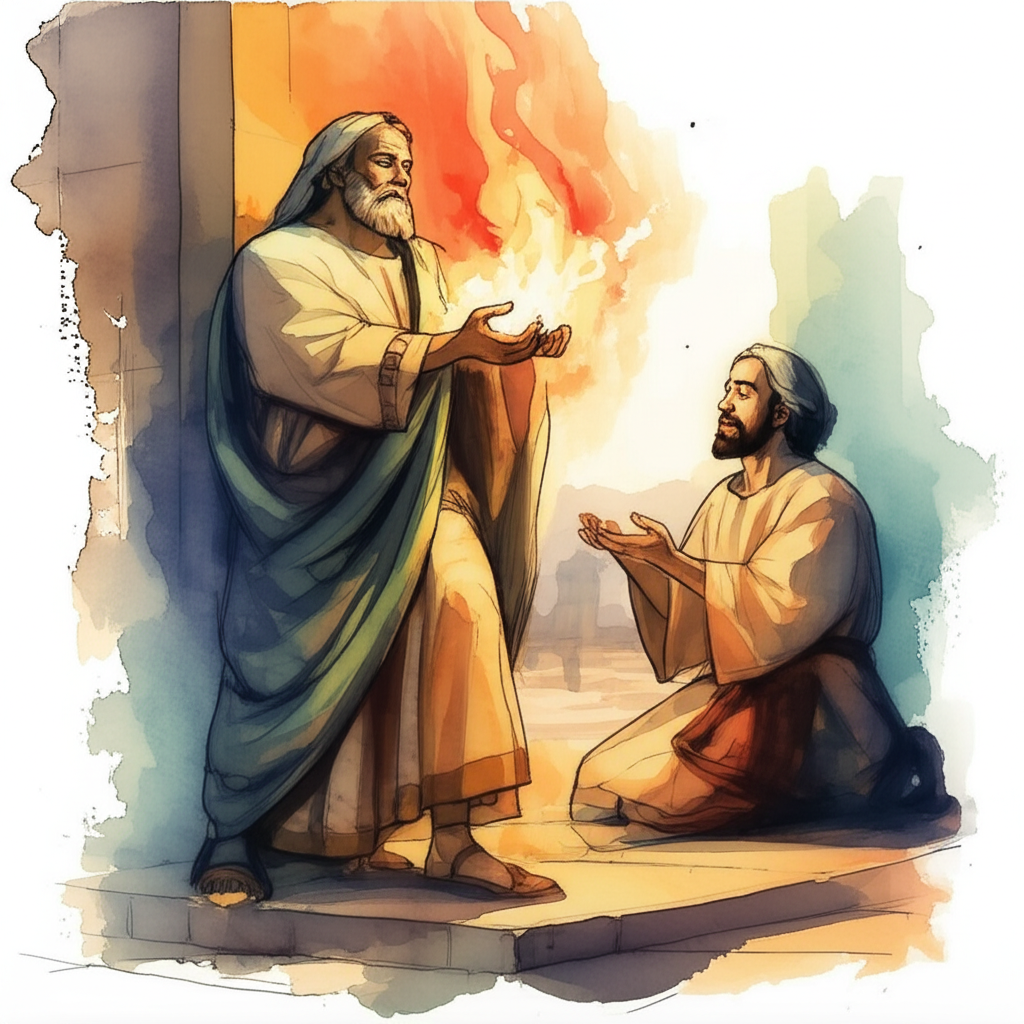
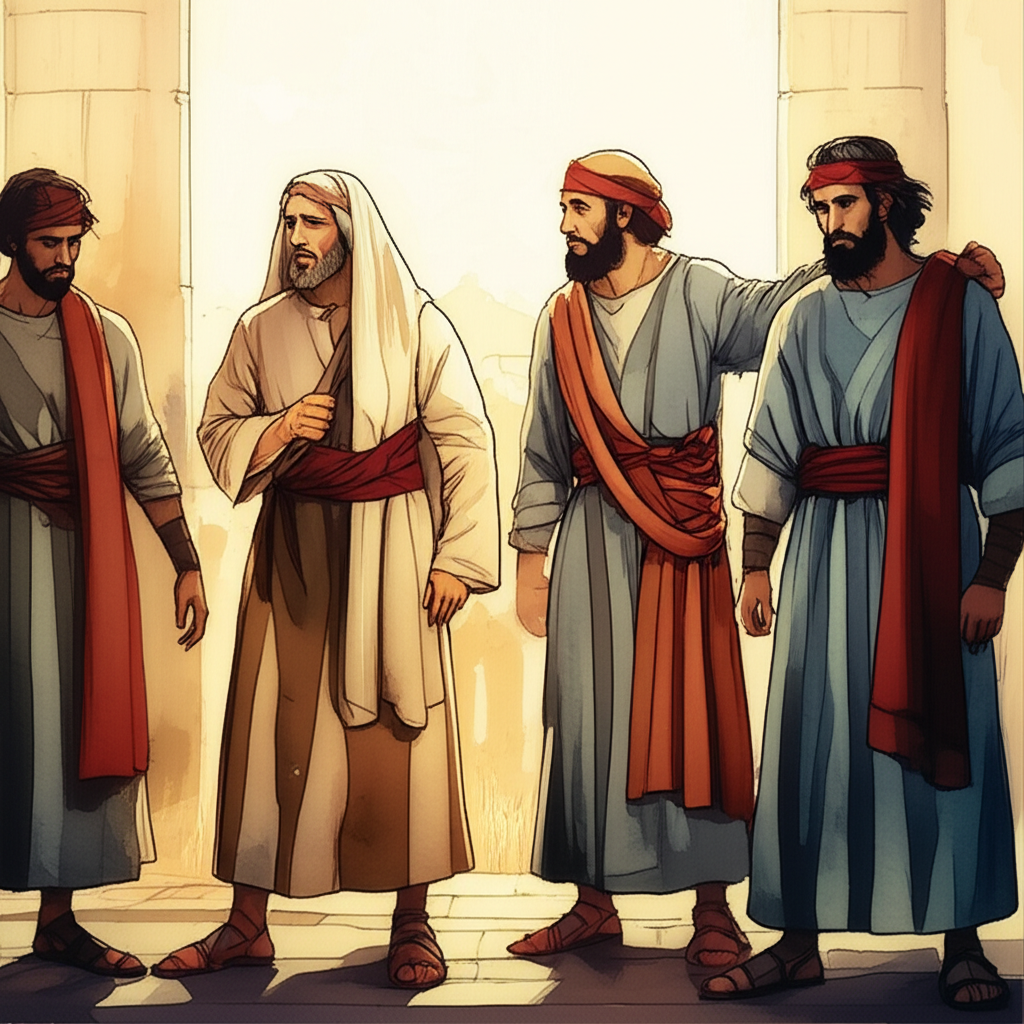

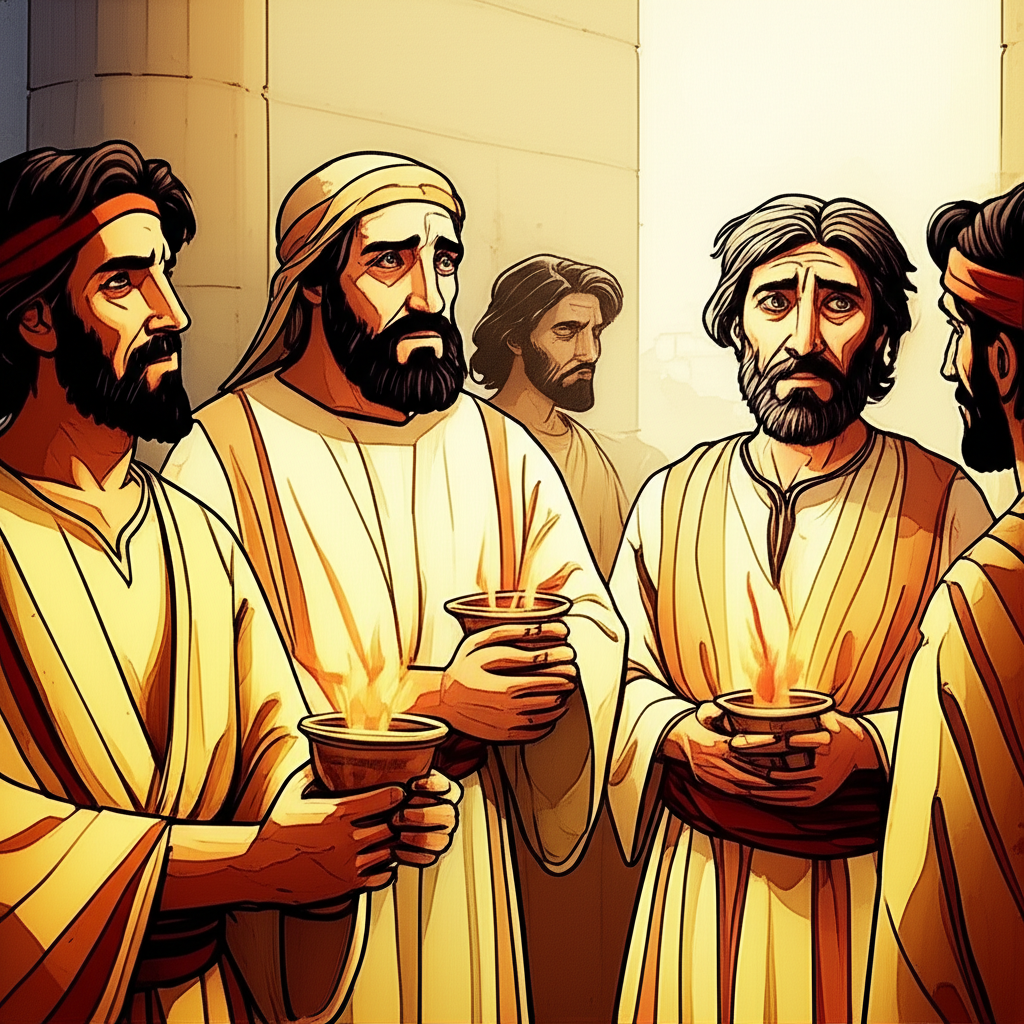
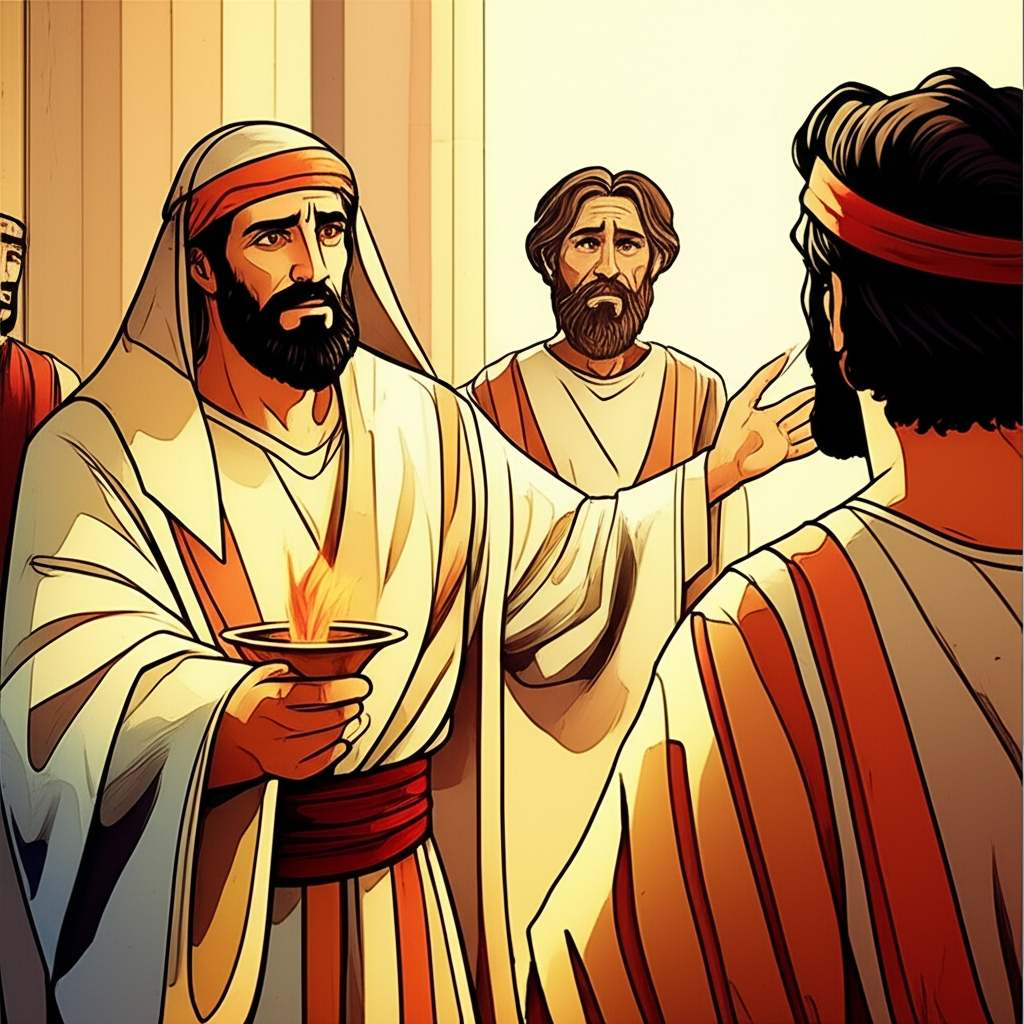
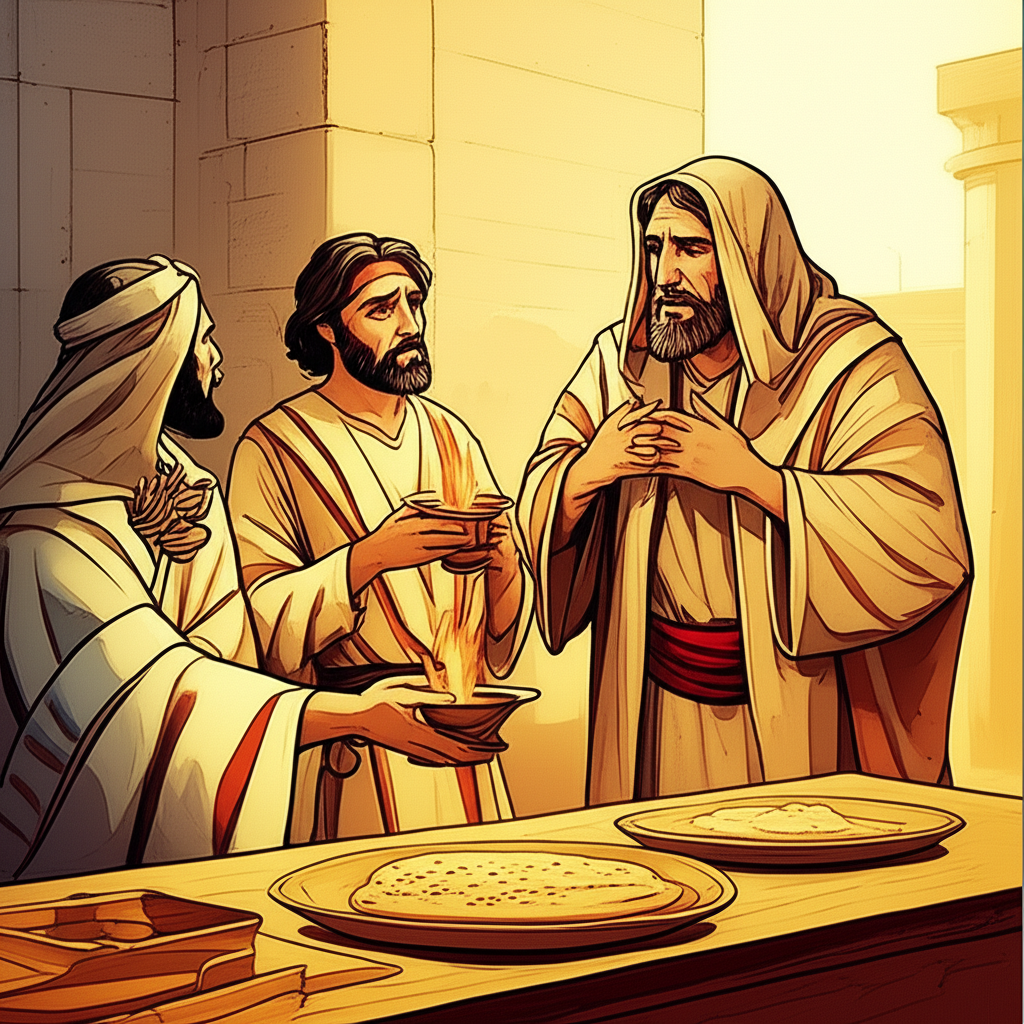
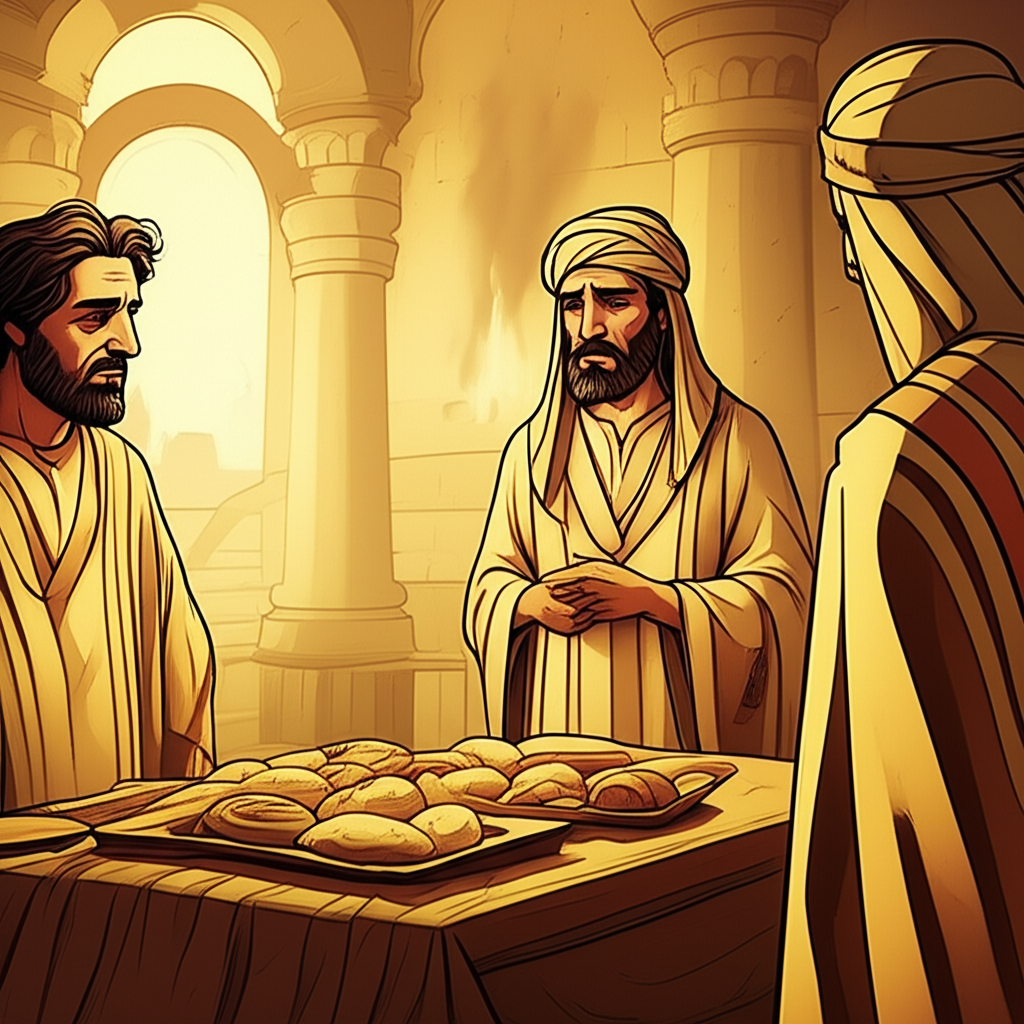
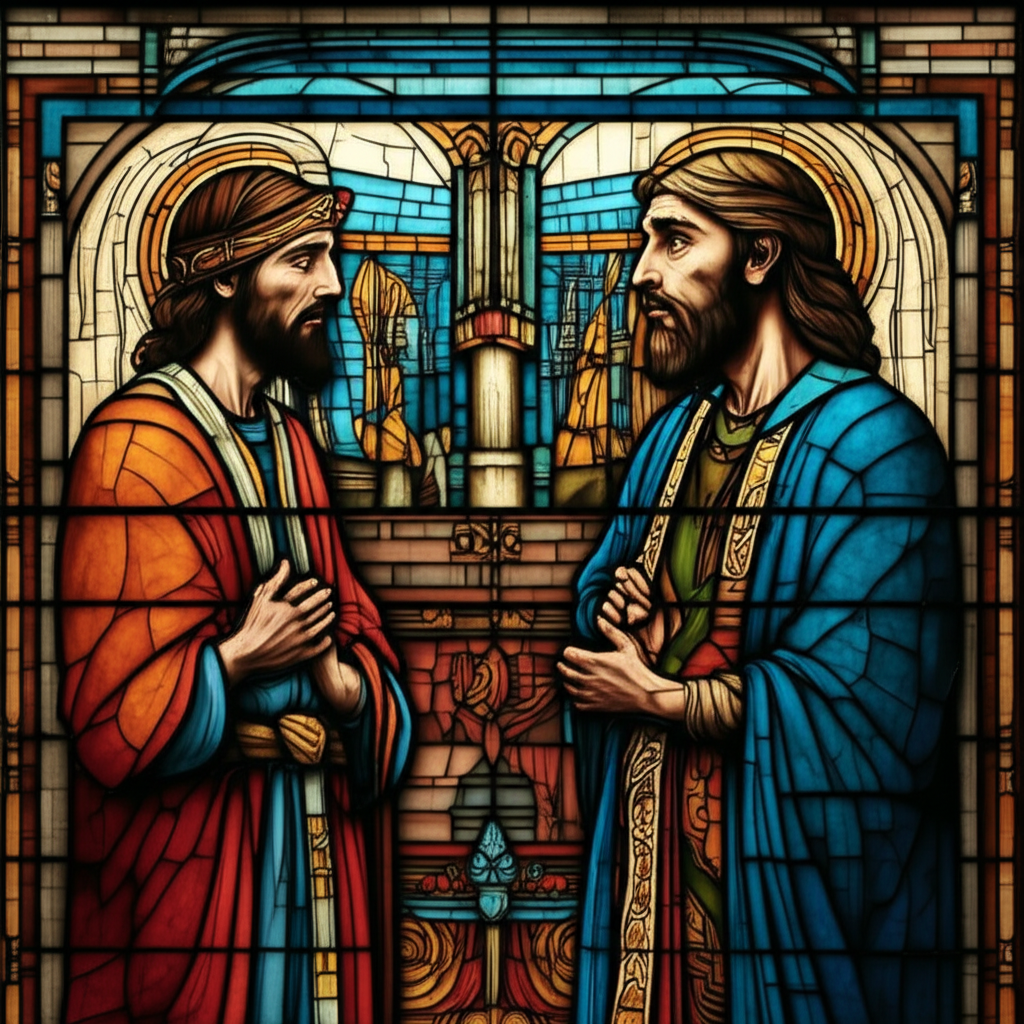
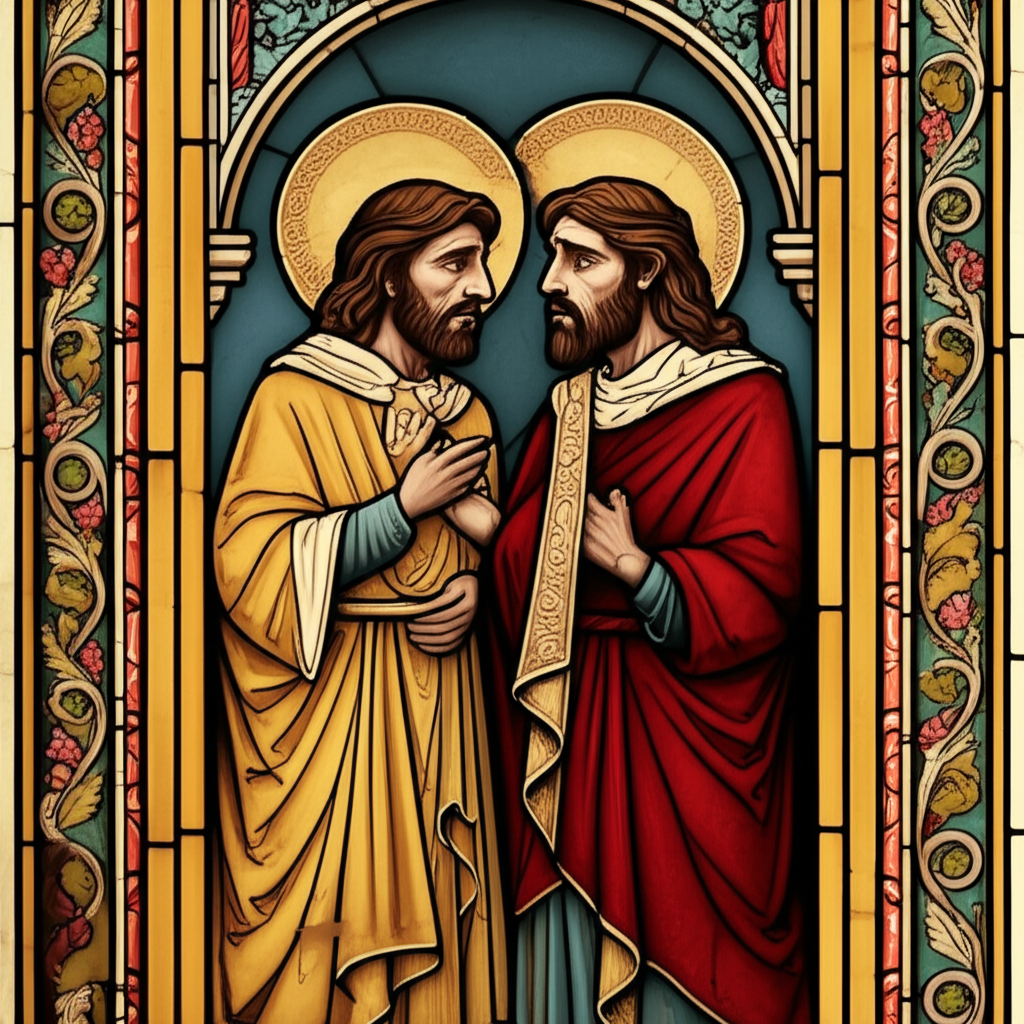
Leviticus chapter 10 kjv
- 1 And Nadab and Abihu, the sons of Aaron, took either of them his censer, and put fire therein, and put incense thereon, and offered strange fire before the LORD, which he commanded them not.
- 2 And there went out fire from the LORD, and devoured them, and they died before the LORD.
- 3 Then Moses said unto Aaron, This is it that the LORD spake, saying, I will be sanctified in them that come nigh me, and before all the people I will be glorified. And Aaron held his peace.
- 4 And Moses called Mishael and Elzaphan, the sons of Uzziel the uncle of Aaron, and said unto them, Come near, carry your brethren from before the sanctuary out of the camp.
- 5 So they went near, and carried them in their coats out of the camp; as Moses had said.
- 6 And Moses said unto Aaron, and unto Eleazar and unto Ithamar, his sons, Uncover not your heads, neither rend your clothes; lest ye die, and lest wrath come upon all the people: but let your brethren, the whole house of Israel, bewail the burning which the LORD hath kindled.
- 7 And ye shall not go out from the door of the tabernacle of the congregation, lest ye die: for the anointing oil of the LORD is upon you. And they did according to the word of Moses.
- 8 And the LORD spake unto Aaron, saying,
- 9 Do not drink wine nor strong drink, thou, nor thy sons with thee, when ye go into the tabernacle of the congregation, lest ye die: it shall be a statute for ever throughout your generations:
- 10 And that ye may put difference between holy and unholy, and between unclean and clean;
- 11 And that ye may teach the children of Israel all the statutes which the LORD hath spoken unto them by the hand of Moses.
- 12 And Moses spake unto Aaron, and unto Eleazar and unto Ithamar, his sons that were left, Take the meat offering that remaineth of the offerings of the LORD made by fire, and eat it without leaven beside the altar: for it is most holy:
- 13 And ye shall eat it in the holy place, because it is thy due, and thy sons' due, of the sacrifices of the LORD made by fire: for so I am commanded.
- 14 And the wave breast and heave shoulder shall ye eat in a clean place; thou, and thy sons, and thy daughters with thee: for they be thy due, and thy sons' due, which are given out of the sacrifices of peace offerings of the children of Israel.
- 15 The heave shoulder and the wave breast shall they bring with the offerings made by fire of the fat, to wave it for a wave offering before the LORD; and it shall be thine, and thy sons' with thee, by a statute for ever; as the LORD hath commanded.
- 16 And Moses diligently sought the goat of the sin offering, and, behold, it was burnt: and he was angry with Eleazar and Ithamar, the sons of Aaron which were left alive, saying,
- 17 Wherefore have ye not eaten the sin offering in the holy place, seeing it is most holy, and God hath given it you to bear the iniquity of the congregation, to make atonement for them before the LORD?
- 18 Behold, the blood of it was not brought in within the holy place: ye should indeed have eaten it in the holy place, as I commanded.
- 19 And Aaron said unto Moses, Behold, this day have they offered their sin offering and their burnt offering before the LORD; and such things have befallen me: and if I had eaten the sin offering to day, should it have been accepted in the sight of the LORD?
- 20 And when Moses heard that, he was content.
Leviticus chapter 10 nkjv
- 1 Then Nadab and Abihu, the sons of Aaron, each took his censer and put fire in it, put incense on it, and offered profane fire before the LORD, which He had not commanded them.
- 2 So fire went out from the LORD and devoured them, and they died before the LORD.
- 3 And Moses said to Aaron, "This is what the LORD spoke, saying: 'By those who come near Me I must be regarded as holy; And before all the people I must be glorified.' " So Aaron held his peace.
- 4 Then Moses called Mishael and Elzaphan, the sons of Uzziel the uncle of Aaron, and said to them, "Come near, carry your brethren from before the sanctuary out of the camp."
- 5 So they went near and carried them by their tunics out of the camp, as Moses had said.
- 6 And Moses said to Aaron, and to Eleazar and Ithamar, his sons, "Do not uncover your heads nor tear your clothes, lest you die, and wrath come upon all the people. But let your brethren, the whole house of Israel, bewail the burning which the LORD has kindled.
- 7 You shall not go out from the door of the tabernacle of meeting, lest you die, for the anointing oil of the LORD is upon you." And they did according to the word of Moses.
- 8 Then the LORD spoke to Aaron, saying:
- 9 "Do not drink wine or intoxicating drink, you, nor your sons with you, when you go into the tabernacle of meeting, lest you die. It shall be a statute forever throughout your generations,
- 10 that you may distinguish between holy and unholy, and between unclean and clean,
- 11 and that you may teach the children of Israel all the statutes which the LORD has spoken to them by the hand of Moses."
- 12 And Moses spoke to Aaron, and to Eleazar and Ithamar, his sons who were left: "Take the grain offering that remains of the offerings made by fire to the LORD, and eat it without leaven beside the altar; for it is most holy.
- 13 You shall eat it in a holy place, because it is your due and your sons' due, of the sacrifices made by fire to the LORD; for so I have been commanded.
- 14 The breast of the wave offering and the thigh of the heave offering you shall eat in a clean place, you, your sons, and your daughters with you; for they are your due and your sons' due, which are given from the sacrifices of peace offerings of the children of Israel.
- 15 The thigh of the heave offering and the breast of the wave offering they shall bring with the offerings of fat made by fire, to offer as a wave offering before the LORD. And it shall be yours and your sons' with you, by a statute forever, as the LORD has commanded."
- 16 Then Moses made careful inquiry about the goat of the sin offering, and there it was?burned up. And he was angry with Eleazar and Ithamar, the sons of Aaron who were left, saying,
- 17 "Why have you not eaten the sin offering in a holy place, since it is most holy, and God has given it to you to bear the guilt of the congregation, to make atonement for them before the LORD?
- 18 See! Its blood was not brought inside the holy place; indeed you should have eaten it in a holy place, as I commanded."
- 19 And Aaron said to Moses, "Look, this day they have offered their sin offering and their burnt offering before the LORD, and such things have befallen me! If I had eaten the sin offering today, would it have been accepted in the sight of the LORD?"
- 20 So when Moses heard that, he was content.
Leviticus chapter 10 niv
- 1 Aaron's sons Nadab and Abihu took their censers, put fire in them and added incense; and they offered unauthorized fire before the LORD, contrary to his command.
- 2 So fire came out from the presence of the LORD and consumed them, and they died before the LORD.
- 3 Moses then said to Aaron, "This is what the LORD spoke of when he said: "?'Among those who approach me I will be proved holy; in the sight of all the people I will be honored.'?" Aaron remained silent.
- 4 Moses summoned Mishael and Elzaphan, sons of Aaron's uncle Uzziel, and said to them, "Come here; carry your cousins outside the camp, away from the front of the sanctuary."
- 5 So they came and carried them, still in their tunics, outside the camp, as Moses ordered.
- 6 Then Moses said to Aaron and his sons Eleazar and Ithamar, "Do not let your hair become unkempt and do not tear your clothes, or you will die and the LORD will be angry with the whole community. But your relatives, all the Israelites, may mourn for those the LORD has destroyed by fire.
- 7 Do not leave the entrance to the tent of meeting or you will die, because the LORD's anointing oil is on you." So they did as Moses said.
- 8 Then the LORD said to Aaron,
- 9 "You and your sons are not to drink wine or other fermented drink whenever you go into the tent of meeting, or you will die. This is a lasting ordinance for the generations to come,
- 10 so that you can distinguish between the holy and the common, between the unclean and the clean,
- 11 and so you can teach the Israelites all the decrees the LORD has given them through Moses."
- 12 Moses said to Aaron and his remaining sons, Eleazar and Ithamar, "Take the grain offering left over from the food offerings prepared without yeast and presented to the LORD and eat it beside the altar, for it is most holy.
- 13 Eat it in the sanctuary area, because it is your share and your sons' share of the food offerings presented to the LORD; for so I have been commanded.
- 14 But you and your sons and your daughters may eat the breast that was waved and the thigh that was presented. Eat them in a ceremonially clean place; they have been given to you and your children as your share of the Israelites' fellowship offerings.
- 15 The thigh that was presented and the breast that was waved must be brought with the fat portions of the food offerings, to be waved before the LORD as a wave offering. This will be the perpetual share for you and your children, as the LORD has commanded."
- 16 When Moses inquired about the goat of the sin offering and found that it had been burned up, he was angry with Eleazar and Ithamar, Aaron's remaining sons, and asked,
- 17 "Why didn't you eat the sin offering in the sanctuary area? It is most holy; it was given to you to take away the guilt of the community by making atonement for them before the LORD.
- 18 Since its blood was not taken into the Holy Place, you should have eaten the goat in the sanctuary area, as I commanded."
- 19 Aaron replied to Moses, "Today they sacrificed their sin offering and their burnt offering before the LORD, but such things as this have happened to me. Would the LORD have been pleased if I had eaten the sin offering today?"
- 20 When Moses heard this, he was satisfied.
Leviticus chapter 10 esv
- 1 Now Nadab and Abihu, the sons of Aaron, each took his censer and put fire in it and laid incense on it and offered unauthorized fire before the LORD, which he had not commanded them.
- 2 And fire came out from before the LORD and consumed them, and they died before the LORD.
- 3 Then Moses said to Aaron, "This is what the LORD has said: 'Among those who are near me I will be sanctified, and before all the people I will be glorified.'" And Aaron held his peace.
- 4 And Moses called Mishael and Elzaphan, the sons of Uzziel the uncle of Aaron, and said to them, "Come near; carry your brothers away from the front of the sanctuary and out of the camp."
- 5 So they came near and carried them in their coats out of the camp, as Moses had said.
- 6 And Moses said to Aaron and to Eleazar and Ithamar his sons, "Do not let the hair of your heads hang loose, and do not tear your clothes, lest you die, and wrath come upon all the congregation; but let your brothers, the whole house of Israel, bewail the burning that the LORD has kindled.
- 7 And do not go outside the entrance of the tent of meeting, lest you die, for the anointing oil of the LORD is upon you." And they did according to the word of Moses.
- 8 And the LORD spoke to Aaron, saying,
- 9 "Drink no wine or strong drink, you or your sons with you, when you go into the tent of meeting, lest you die. It shall be a statute forever throughout your generations.
- 10 You are to distinguish between the holy and the common, and between the unclean and the clean,
- 11 and you are to teach the people of Israel all the statutes that the LORD has spoken to them by Moses."
- 12 Moses spoke to Aaron and to Eleazar and Ithamar, his surviving sons: "Take the grain offering that is left of the LORD's food offerings, and eat it unleavened beside the altar, for it is most holy.
- 13 You shall eat it in a holy place, because it is your due and your sons' due, from the LORD's food offerings, for so I am commanded.
- 14 But the breast that is waved and the thigh that is contributed you shall eat in a clean place, you and your sons and your daughters with you, for they are given as your due and your sons' due from the sacrifices of the peace offerings of the people of Israel.
- 15 The thigh that is contributed and the breast that is waved they shall bring with the food offerings of the fat pieces to wave for a wave offering before the LORD, and it shall be yours and your sons' with you as a due forever, as the LORD has commanded."
- 16 Now Moses diligently inquired about the goat of the sin offering, and behold, it was burned up! And he was angry with Eleazar and Ithamar, the surviving sons of Aaron, saying,
- 17 "Why have you not eaten the sin offering in the place of the sanctuary, since it is a thing most holy and has been given to you that you may bear the iniquity of the congregation, to make atonement for them before the LORD?
- 18 Behold, its blood was not brought into the inner part of the sanctuary. You certainly ought to have eaten it in the sanctuary, as I commanded."
- 19 And Aaron said to Moses, "Behold, today they have offered their sin offering and their burnt offering before the LORD, and yet such things as these have happened to me! If I had eaten the sin offering today, would the LORD have approved?"
- 20 And when Moses heard that, he approved.
Leviticus chapter 10 nlt
- 1 Aaron's sons Nadab and Abihu put coals of fire in their incense burners and sprinkled incense over them. In this way, they disobeyed the LORD by burning before him the wrong kind of fire, different than he had commanded.
- 2 So fire blazed forth from the LORD's presence and burned them up, and they died there before the LORD.
- 3 Then Moses said to Aaron, "This is what the LORD meant when he said, 'I will display my holiness
through those who come near me.
I will display my glory
before all the people.'"
And Aaron was silent. - 4 Then Moses called for Mishael and Elzaphan, Aaron's cousins, the sons of Aaron's uncle Uzziel. He said to them, "Come forward and carry away the bodies of your relatives from in front of the sanctuary to a place outside the camp."
- 5 So they came forward and picked them up by their garments and carried them out of the camp, just as Moses had commanded.
- 6 Then Moses said to Aaron and his sons Eleazar and Ithamar, "Do not show grief by leaving your hair uncombed or by tearing your clothes. If you do, you will die, and the LORD's anger will strike the whole community of Israel. However, the rest of the Israelites, your relatives, may mourn because of the LORD's fiery destruction of Nadab and Abihu.
- 7 But you must not leave the entrance of the Tabernacle or you will die, for you have been anointed with the LORD's anointing oil." So they did as Moses commanded.
- 8 Then the LORD said to Aaron,
- 9 "You and your descendants must never drink wine or any other alcoholic drink before going into the Tabernacle. If you do, you will die. This is a permanent law for you, and it must be observed from generation to generation.
- 10 You must distinguish between what is sacred and what is common, between what is ceremonially unclean and what is clean.
- 11 And you must teach the Israelites all the decrees that the LORD has given them through Moses."
- 12 Then Moses said to Aaron and his remaining sons, Eleazar and Ithamar, "Take what is left of the grain offering after a portion has been presented as a special gift to the LORD, and eat it beside the altar. Make sure it contains no yeast, for it is most holy.
- 13 You must eat it in a sacred place, for it has been given to you and your descendants as your portion of the special gifts presented to the LORD. These are the commands I have been given.
- 14 But the breast and thigh that were lifted up as a special offering may be eaten in any place that is ceremonially clean. These parts have been given to you and your descendants as your portion of the peace offerings presented by the people of Israel.
- 15 You must lift up the thigh and breast as a special offering to the LORD, along with the fat of the special gifts. These parts will belong to you and your descendants as your permanent right, just as the LORD has commanded."
- 16 Moses then asked them what had happened to the goat of the sin offering. When he discovered it had been burned up, he became very angry with Eleazar and Ithamar, Aaron's remaining sons.
- 17 "Why didn't you eat the sin offering in the sacred area?" he demanded. "It is a holy offering! The LORD has given it to you to remove the guilt of the community and to purify the people, making them right with the LORD.
- 18 Since the animal's blood was not brought into the Holy Place, you should have eaten the meat in the sacred area as I ordered you."
- 19 Then Aaron answered Moses, "Today my sons presented both their sin offering and their burnt offering to the LORD. And yet this tragedy has happened to me. If I had eaten the people's sin offering on such a tragic day as this, would the LORD have been pleased?"
- 20 And when Moses heard this, he was satisfied.
- Bible Book of Leviticus
- 1 Laws for Burnt Offerings
- 2 Laws for Grain Offerings
- 3 Laws for Peace Offerings
- 4 Sacrifies for Sin
- 5 Laws for Guilt Offerings
- 6 The Priests and the Offerings
- 7 Law of the trespass offering
- 8 Consecration of Aaron and His Sons
- 9 The Lord Accepts Aaron's Offering
- 10 The Death of Nadab and Abihu
- 11 Clean and unclean Animals
- 12 Purification After Childbirth
- 13 Laws About Leprosy
- 14 Laws for Cleansing Lepers
- 15 Sperm Discharge and Menstruation cycle
- 16 Day of Atonement
- 17 The Place of Sacrifice
- 18 Unlawful Sexual Relations
- 19 Levitical Laws for Levites
- 20 Punishment for Child Sacrifice
- 21 Holiness and the Priests
- 22 Acceptable Offerings
- 23 The Feasts of the Lord
- 24 The Lamps
- 25 Year of Jubilee
- 26 Blessings for Obedience
- 27 Laws About Vows